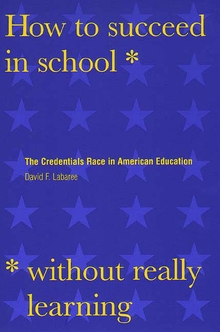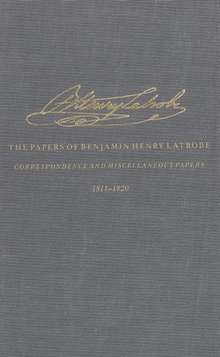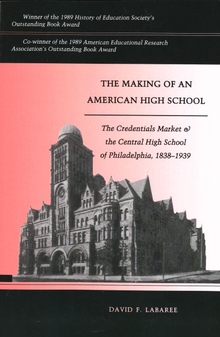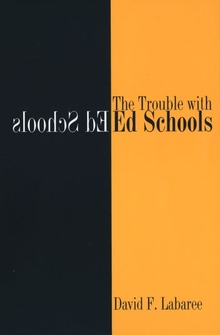How to Succeed in School Without Really Learning
WARNING
You are viewing an older version of the Yalebooks website. Please visit out new website with more updated information and a better user experience: https://www.yalebooks.com
The Credentials Race in American Education
David F. Labaree
Labaree examines the competing intellectual and ideological traditions that have fought for dominance in our public schools from the nineteenth century to the present. He claims that by thinking of education primarily as the route to individual advancement, we are defining it as a private good—a means of gaining a competitive advantage over other people. He endorses an alternative vision, one that sees education as a public good, providing society with benefits that can be collectively shared—for example, by producing citizens who are politically responsible and workers who are economically productive. He points out that when education is seen primarily as a private consumer good, a number of consequences follow. Formal characteristics of schooling—grades, credits, and degrees—come to assume greater weight than substantive characteristics, such as actually learning something. Grading becomes more important for its social consequences than for its pedagogical uses. For these and other reasons, the pursuit of certification and degrees takes precedence over the goals of learning, and the private benefits of schooling take precedence over its democratic and civic functions.
David F. Labaree, associate professor of education at Michigan State University, is also the author of The Making of an American High School.
"A spirited and compelling argument."—Larry Cuban, History of Education Quarterly
"The book is a compelling argument for resisting educational consumerism in the name of school choice."—Rethinking Schools
"Makes an important contribution to the educational literature, particularly in the area of school reform. . . . He organizes important concepts and provides documentation and indepth historical perspective. . . . Direct us carefully to the future and have value for those interested in the educational issues our society is facing as we move into the next century. . . . Readable and insightful and provide important information concerning college classrooms, school systems and educational reform, as they deal with the problems schools face regularly."—Sally H. Wertheim, America
"Readers from a variety of backgrounds will find this book useful and thought provoking."—Christopher D. Campbell, Contemporary Sociology
"Labaree has done a wonderful service. He has unpacked the multiple goal structure of American education and allowed us to see one of the most positive attributes of our schools, their ability to sponsor social mobility, as a problem. His explication of the paradox of social mobility sets this book apart and makes it required reading for all of us concerned not only with the rising tide of apathy among our students but with the public purposes of education itself."—Theodore R. Mitchell, Change
"A thought-provoking, even provocative and penetrating book."—Douglas W. Steeples, Business Library Review
"Labaree’s book is an incisive dissection and analysis of the built-in structural contradictions in our public education system. It deserves a wide readership among scholars and laypersons." —Jurgen Herbst, Journal of American History
"Labaree is especially adept at pointing out the ways in which conflicted goals lead to contradictory behavior. Labaree’s compendium of analyses and arguments clarifies basic issues at the core of what seem like intractable political tempests."—John Palattella, University Business
"A wonderful book that draws on the history and sociology of education to show why schools have been increasingly oriented around the awarding of credentials rather than the pursuit of learning."—William Reese, author of The Origins of the American High School
"Labaree's book is an incisive dissection and analysis of the built-in structural contradictions in our public education system. It deserves a wide readership among scholars and laypersons."—Jurgen Herbst, Journal of American History
"Makes an important contribution to the education literature, particularly in the area of school reform. . . . Directs us carefully to the future and has value for those interested in the educational issues our society is facing as we move into the next century. . . . Readable and insightful, [this book provides] important information concerning college classrooms, school systems and education reform, as they deal with the problems schools face regularly."—Sally H. Wertheim, America
"Readers from a variety of backgrounds will find this book useful and thought-provoking."—Christopher D. Campbell, Contemporary Sociology
"Labaree's explication of the paradox of social mobility sets this book apart and makes it required reading for all of us concerned not only with the rising tide of apathy among our students but with the public purposes of education itself."—Theodore R. Mitchell, Change
"With clear, coherent, and crisp writing, Labaree offers a spirited and compelling argument."—Larry Cuban, History of Education Quarterly
Publication Date: April 10, 1999









